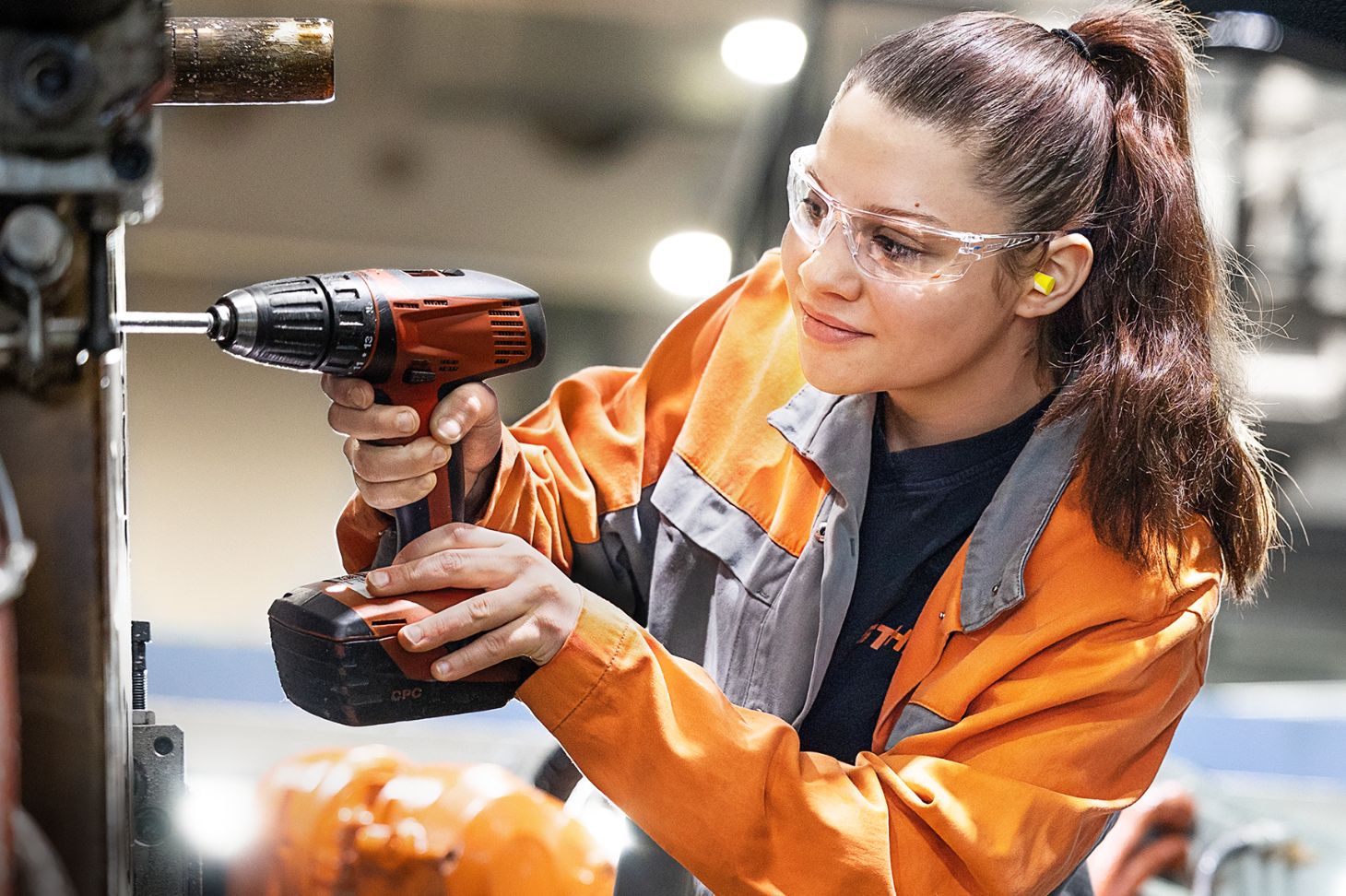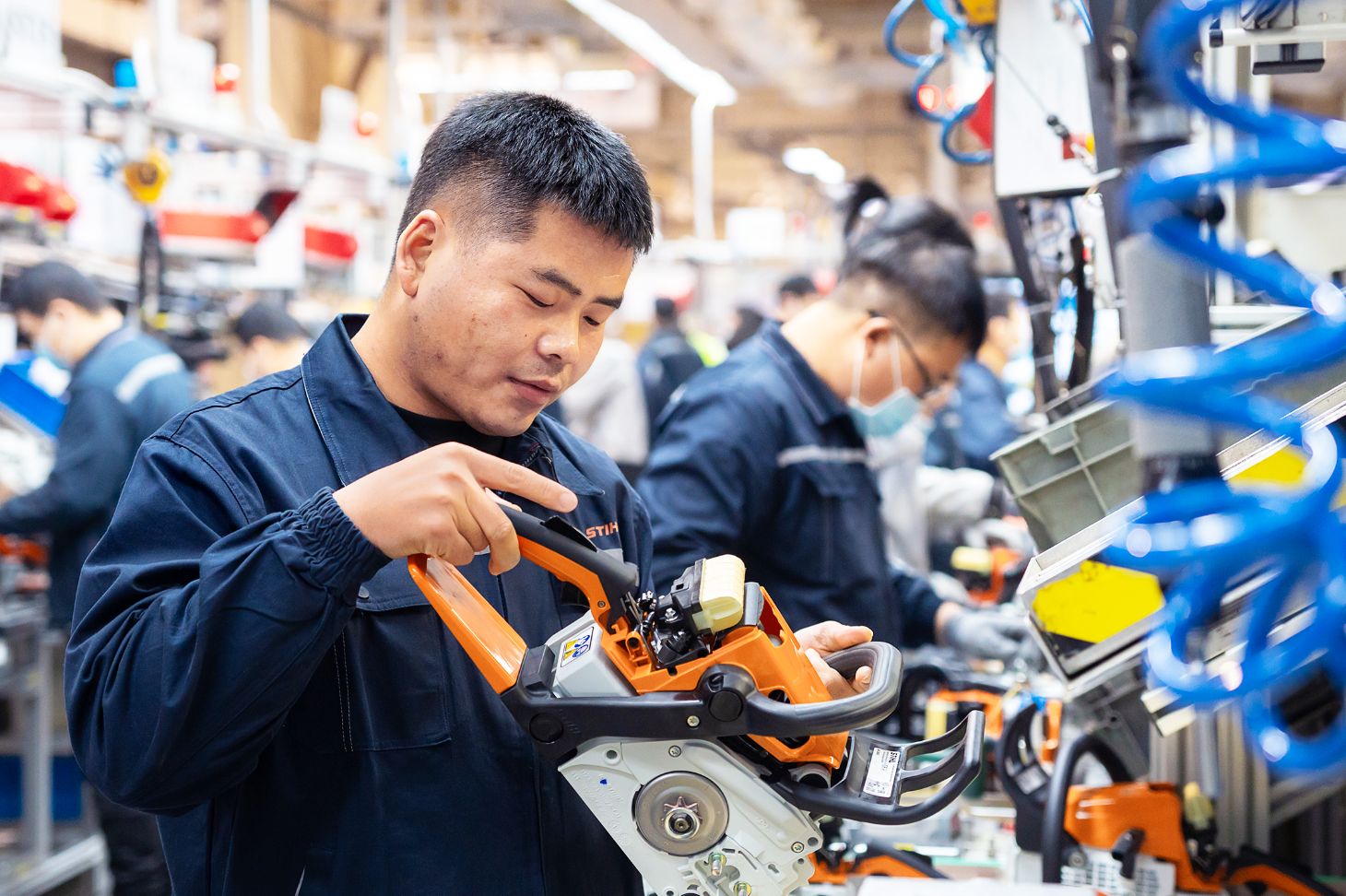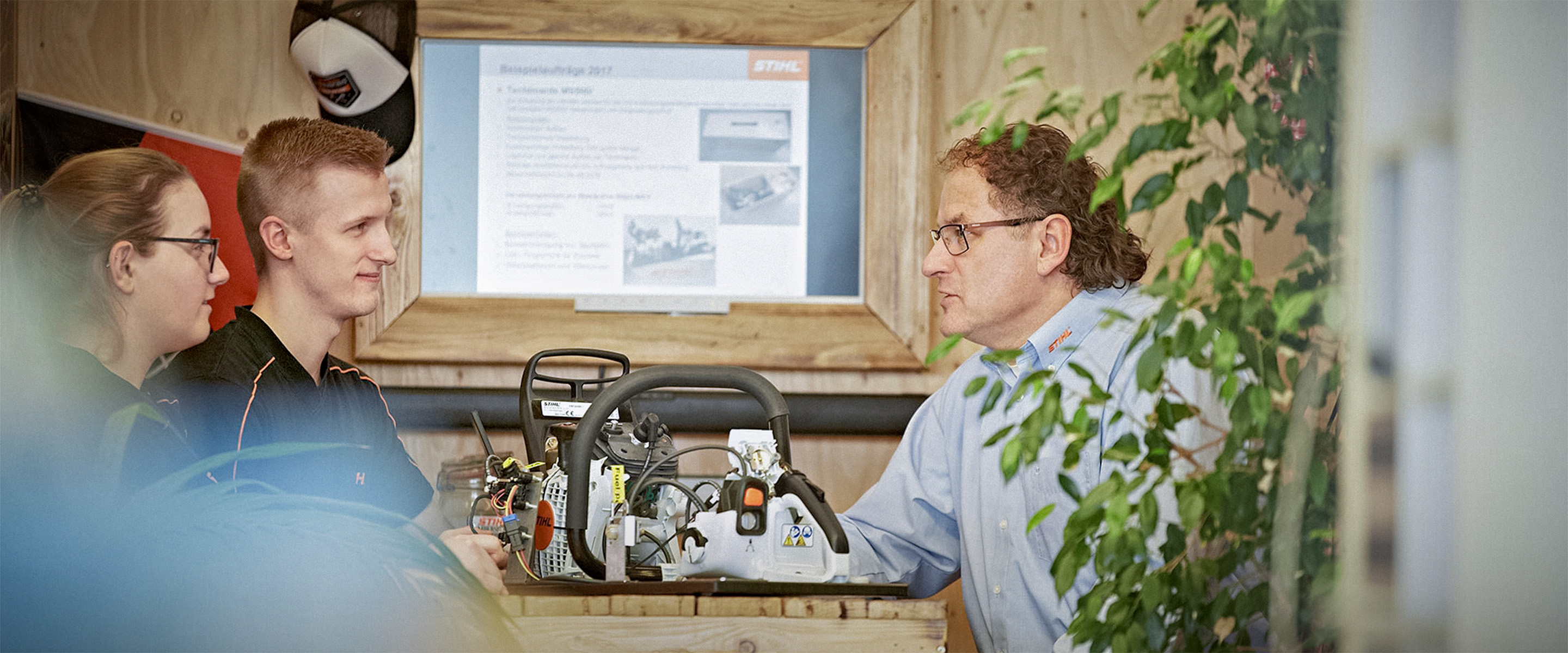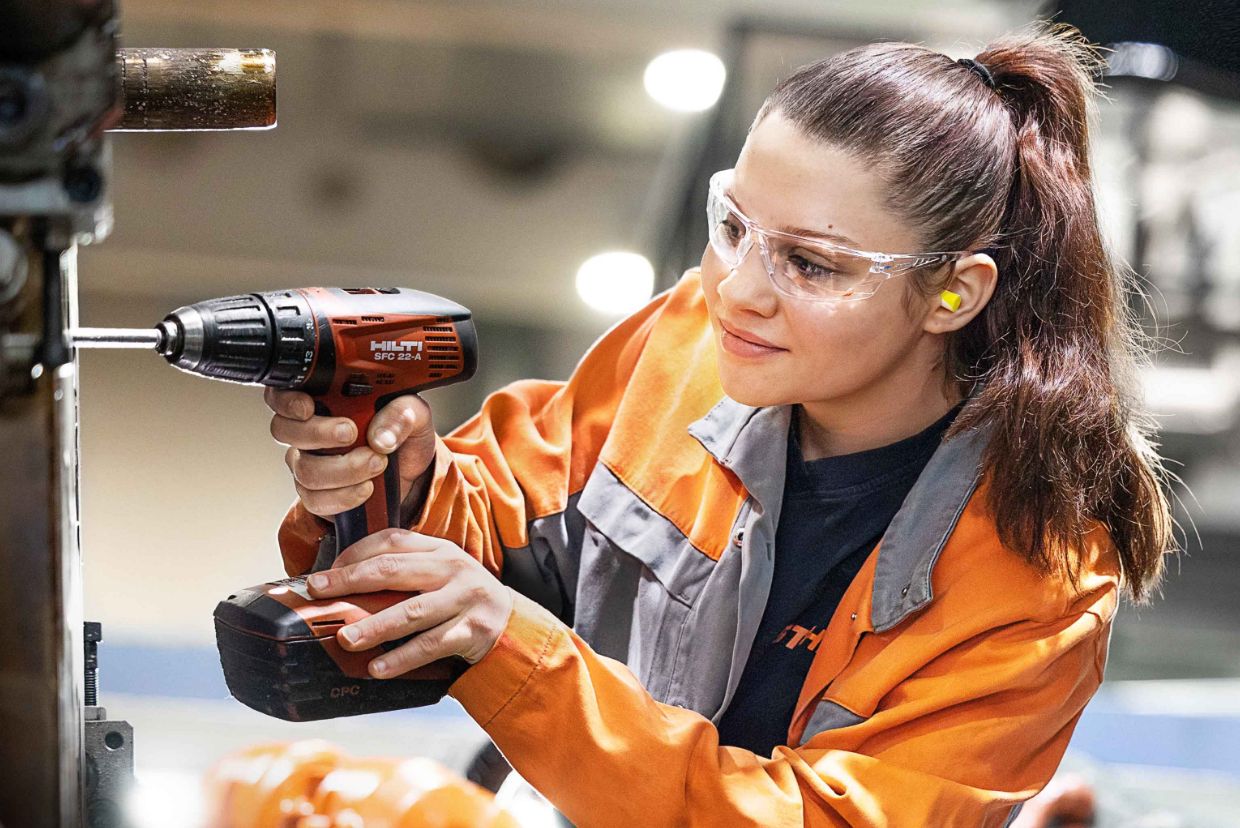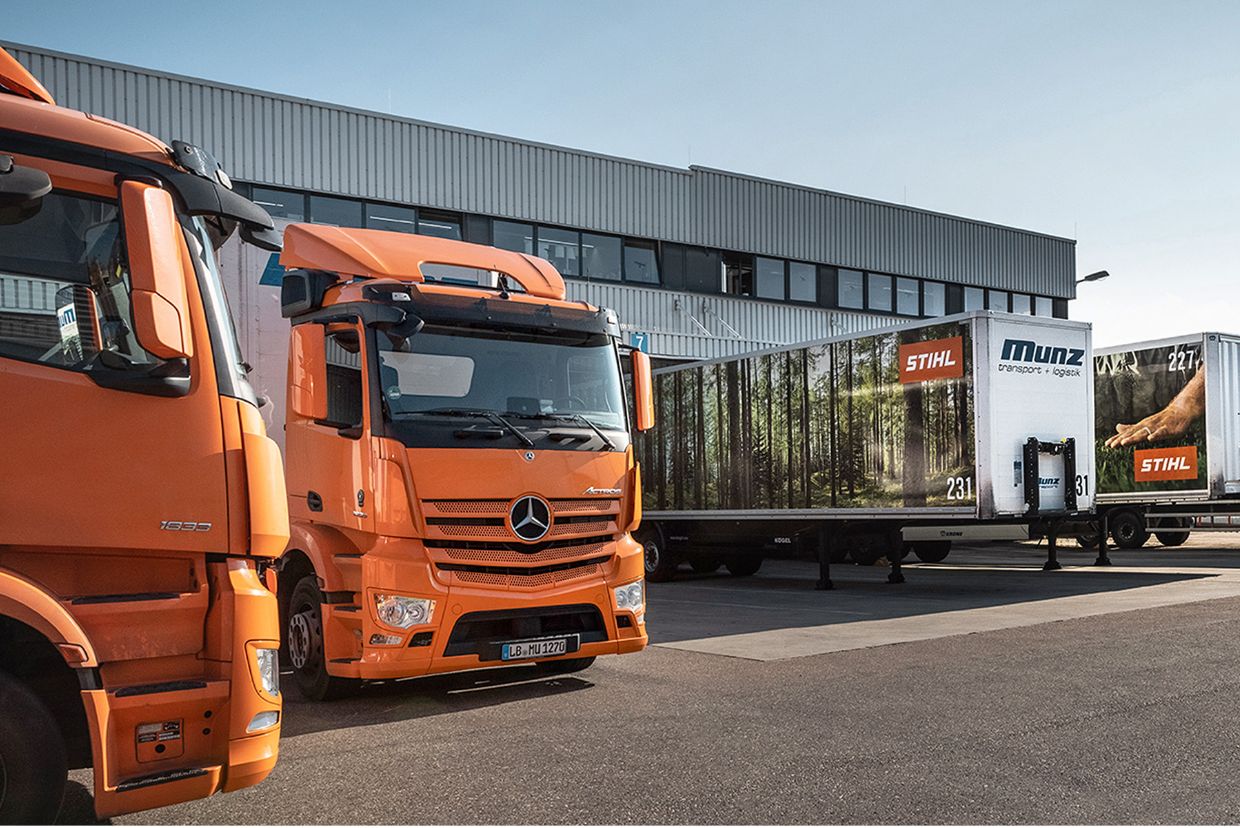Side by side and hand in hand
As an employer, STIHL Group companies combine the advantages of a family-owned business and a global market leader. Our corporate culture is built on partnership, with extensive benefits and family-friendly working hours. This fundamental attitude is shared across our locations around the world and gives all employees the opportunity to grow at STIHL.
Organization and responsibilities
Overall strategic responsibility for personnel management at the STIHL Group lies with the STIHL AG Executive Board member for Human Resources and Legal Affairs. Each major STIHL company has its own human resources department, whose work is subject to guidelines set by the founding company. The guidelines cover topics such as introducing and changing pension systems, rules and conditions for temporary international staffing assignments, and contractual and compensation rules for managers.
International human resources strategy
Human resources, or HR, plays a decisive role in making the transformation from mechanical engineering company to a mechatronic and software specialist a success. Because qualified and motivated employees are the engine of change, the HR team at the founding company has partnered with managers in charge of staffing at the production and sales companies in Germany and France to develop an international HR strategy.
The strategy covers five fields of action:
- ONE HR
- Digital HR
- HR as a transformation partner
- Leadership transformation
- New skills and abilities
Our aim is to establish an HR excellence standard within the STIHL Group. To do this, it is important that the Group’s HR teams continue to grow together on the basis of strategic guidelines. Core HR processes are being harmonized, and a uniform software standard is acting as a technology enabler. Uniform KPIs allow Group-wide analyses of business management to be presented to the Executive Board and Advisory Board. Modern self-service functions for supervisors and employees help create a digital HR world and increase the Group member companies appeal as an employer. For example, they facilitate the entry of personal data and provide support in the internal application and staff development processes. To this end, we launched a project in 2017 to roll out a uniform software standard worldwide. The coming years will see the rollout of the new master data system and the different modules, in particular at the production companies and the large sales companies.
HR acts as a transformation partner both within HR and for the organization as a whole, while also proactively supporting important transformation projects. HR needs to continue developing its own roles and skills in order to drive forward transformation and innovation within the Group.
The transformation also places new demands on the functions of supervisors and their staff. Skills and capabilities that will make us fit for the future need to be developed or integrated into the company. Global management programs are being implemented to prepare executives for their future roles. Part of the strategy includes the development of the global STIHL Leadership Principles, which are designed to guide the leadership transformation. The principles have been undergoing a Group-wide rollout since the launch of the new STIHL Leadership Academy in late 2021.
Employment within the STIHL Group
As of December 31, 2022, STIHL Group companies employed 20,552 people worldwide, an increase of 458 compared to the previous year (20,094, not including temporary agency workers). The other figures given in this report take into account all German locations (including STIHL direct GmbH, STIHL treeva GmbH, and STIHL International GmbH), the Dieburg distribution center, and all production companies, including the ZAMA Group. The companies within this scope of consolidation had a total of 18,667 employees at the end of 2022 (previous year: 18,338, not including temporary agency workers). All other key performance indicators are reported on this basis.
Employment within the STIHL Group
as of Dec. 31
| |
2022 |
2021 |
| Total headcount within the STIHL Group¹
|
20,552 |
20,094 |
| Total headcount within the scope of consolidation¹
|
18,667 |
18,338 |
| Of which apprentices and students |
866 |
889 |
| Average headcount¹
|
18,622 |
17,469 |
| Number of temporary agency workers |
519 |
715 |
|
¹
Not including temporary agency workers. STIHL does not
employ any non-guaranteed-hours employees.
|
Total headcount by type of employment¹
As of Dec. 31 (previous year in parentheses)
In the reporting year, there were 3,594 new hires (previous year: 4,694), including employees with temporary contracts, apprentices, and students, but excluding temporary agency workers. The current reporting system does not provide for a detailed disclosure of new hires by age group or gender. However, such disclosures are under consideration for future reports.
The increase in headcount is attributable to the positive business performance of the STIHL Group, despite the negative impact over the course of the reporting year in connection with the effects of the war in Ukraine and continued supply chain bottlenecks. At STIHL Inc. alone, we welcomed more than 1,000 new employees as part of the largest hiring campaign in the company’s history. Most of those new hires will look after the production, sale, and servicing of battery-operated products. The number of temporary agency workers was slightly below the previous year’s level. STIHL primarily hires temporary agency workers in product-related areas to cover peaks in manufacturing.
STIHL makes every effort to create secure jobs. Roughly 86 percent of our employees now have permanent contracts (previous year: 83 percent). In doing so, we make a contribution within our means to achieving the target of full employment, as stated in the goal “Decent work and economic growth” (United Nations Sustainable Development Goal, SDG 8).
Headcount by region and gender¹
As of Dec. 31 (previous year in parentheses)
Headcount¹ by type of employment and region
As of Dec. 31
Workers’ rights
Open and constructive exchange with employee representatives is a long-standing tradition at STIHL. All STIHL plants in Germany have employee councils, and work agreements for staff are in place. Together, the individual employee councils form the General Employee Council for the founding company. Our international locations have local employee representation bodies in accordance with national law in certain countries, such as Brazil and China. Many production companies are subject to collective bargaining agreements or similar collective wage structures, which cover roughly 56 percent (previous year: 55 percent) of all staff. Generally, our employees in all countries receive remuneration in line with market rates. By protecting workers’ rights, we are making our contribution to achieving the goal “Decent work and economic growth” (United Nations Sustainable Development Goal, SDG 8).
Attractive employer
Fair cooperation in a spirit of partnership is a key element of our corporate culture, which manifests itself in support from colleagues and open communication. As a result, long terms of service and low rates of voluntary resignation (excluding retirements) are the norm at nearly all of our locations. Turnover among permanent staff not employed in production stood at 4.1 percent, according to the most recent statistics (previous year: 3.7 percent). Due to the low rate, we do not keep records of voluntary resignation by region, gender, or age group.
To foster international networks and cooperation within the STIHL Group, we offer employees the opportunity to work abroad. Experience and exchange with colleagues at other subsidiaries promotes the sharing of knowledge and strengthens mutual understanding and collaboration, which in turn enriches the STIHL Group as a whole. We strengthen team spirit through a variety of activities, including celebrations, outings, and competitions, as well as events to mark International Women’s Day, Mother’s Day, and Father’s Day.
Benefits and perks
STIHL employees have long enjoyed voluntary social benefits that go far beyond what is agreed upon through collective bargaining.
At nearly all STIHL companies, eligible employees receive a bonus linked to financial performance every year. Employees at the founding company can also take part in a company pension plan that is financed entirely by STIHL and acquire profit participation rights within the scope of a stock ownership plan that consists of an employee contribution (one-third) and an employer subsidy (two-thirds). The profit participation rights may offer yields as high as ten percent, depending on the company’s success, allowing staff members to profit from their dedication and performance by adding to their savings.
In addition, a new employment and site-guarantee agreement through the end of 2025 was signed in late 2021. The agreement gives core staff at the founding company a four-year employment guarantee. In it, STIHL has also made a commitment to continue providing extensive vocational training and support to new employees just entering the workforce. Employment and site-guarantee agreements have played an important role in developing the business and safeguarding jobs at STIHL for more than 20 years.
Awards
The U.S. magazine “Forbes” ranks STIHL 89th on its latest list of the “World’s Best Employers.” In 2022, the STIHL Group company in São Leopoldo, Brazil, was once again named a “Great Place to Work,” with STIHL China also receiving the same honors and STIHL Tirol being recognized as one of Austria’s ten best employers. Meanwhile, the internship program at STIHL Inc. in the U.S. won the 2022 Top Employer for Interns award.
Work–life balance
STIHL offers employees a wide range of options for achieving an optimal work–life balance. At most locations, Group member companies work with employees to arrange working models that are flexible enough to take childcare, family care, and other personal circumstances into account. In addition, we support staff by offering part-time models and local perks such as corporate childcare. At the Waiblingen and Ludwigsburg locations in Germany, we have started expanding childcare capacities by 70 percent, with the goal of offering 60 spots. New mothers at our Swiss chain plant and STIHL Brazil can also make use of newly added lactation rooms.
The coronavirus pandemic has further reinforced the advantages of remote working for employees and employers. That is why we have decided to continue offering options to work from home, even though the most significant pandemic-related restrictions have been lifted. Employees and their supervisors are encouraged to reach individual agreements. At the founding company, our distribution center in Dieburg, and STIHL Brazil, for example, the guidelines call for staff to be in the office 60 percent of the time, with remote working possible for the remaining 40 percent of their hours.
Diversity and equal opportunity
Promoting diversity and equal opportunity is part of a sustainable HR policy and plays a key role in the sustainable success of the Group. Our efforts are backed by values such as internationality, transparency, and diversity, which are what set our global family-owned business apart. We aim to empower our employees to bring their strengths, experiences, and potential to the fore, regardless of their gender, origin, age, and other traits. We do not tolerate racism or any form of discrimination, and we support the inclusion of people with disabilities. STIHL Austria’s commitment to hiring people with disabilities, for example, has earned recognition from the Austrian state of Tyrol. To further enhance our diversity strategy, our locations in Germany are currently conducting a review that will later be used to define development options, targets, and specific projects for Germany as well as the entire Group in line with the corporate strategy.
Total headcount by age¹
As of Dec. 31 (previous year in parentheses)
At the present time, women account for 30 percent of the total workforce within the STIHL Group (previous year: 29 percent). Two of the six STIHL AG Executive Board members are women. As a result, STIHL has more than met the target that was defined by the STIHL AG Supervisory Board in June 2022 of having at least one woman on the Executive Board. With three women and three men, the composition of the Executive Board has been equally balanced since January 2023. Four of the twelve members of the STIHL Supervisory Board are women, exceeding the statutory requirement in Germany of at least 30 percent.
Diversity and inclusion at STIHL Brazil
STIHL Brazil has launched a diversity program that aims to promote knowledge and discussion on the topic of diversity, and to encourage empathy, respect, and inclusion. The project is built on four focal points: people with disabilities, gender, LGBTQI+, and race and ethnicity. The four project groups meet once a month to share knowledge and agree on measures. In 2022, the diversity program achieved a major milestone by founding the Executive Diversity School, a professional education offering for executives that is designed to raise awareness of diversity and provide knowledge.
STIHL Brazil also has experience when it comes to inclusion. Since 1977, the company has employed people with disabilities. Right now, 176 employees, or 5 percent of staff in the country, have physical or cognitive impairments. As a result, STIHL exceeds the legal requirements. The inclusion program covers strategic HR and occupational health and safety targets, as well as improvements to equipment, systems, and processes to ensure accessibility.
Professional development and training
The STIHL competency model
Our employees make a substantial contribution to the success of STIHL through their individual know-how, abilities, and skills. The STIHL competency model has been developed to maintain existing expertise and develop new know-how. Based on findings from surveys and workshops involving employees and supervisors, it forms the foundation for a common understanding of requirements. The model consists of eight fields of competence that relate to specific expertise, as well as motives, attitudes, and values. The scope ranges from entrepreneurial thought and action to partnership-based leadership and shaping change. To ensure a consistent approach to talent development and succession planning throughout the STIHL Group, the competency model is being phased in at all companies.
STIHL learning worlds
At nearly all locations, we offer employees an extensive selection of seminars, including internal and external classroom training sessions and a growing number of digital learning opportunities. The options focus on social and interpersonal skills, methods, project management, and technical training for employees in production. In 2022, each employee received an average of roughly 15 hours of professional development a year (previous year: 12 hours). That figure is not broken down by gender or employee category in our reporting system. However, we plan to keep records of such data in the future.
Our new internal learning management system STIHL HR Online-Training was launched in Germany in 2020 and will be expanded to Brazil in early 2023. Employees can use the system to find out about continuing education and book training directly. STIHL also offers employees support in completing professional training measures, such as pursuing a degree program or gaining master tradesperson certification. We offer technical staff in our gasoline-powered drive technology division a training and qualification program in electrical engineering and mechatronics to support them as we shift our focus to battery-powered drive technology and to empower them to take on new responsibilities at STIHL. Negotiations on the topic of digital learning are currently underway with the employee council. In addition, we have joined forces with departments to set up pages in the cloud for better knowledge management, which we are constantly enhancing and expanding.
Executive development
Leadership that provides motivation and empowerment is crucial to a positive culture of cooperation and the success of the Group. Since managers, executives, and supervisors face a complex array of requirements and expectations, STIHL supports them with country-specific qualification programs. Newer managers at the founding company earn a Führungsführerschein, or “license to lead,” while experienced managers have the opportunity to reflect on and enhance their approach in dedicated sessions. A STIHL mentoring program that allows long-serving managers to pass on their experience to the leaders of tomorrow rounds out the range of offerings. The mentoring program usually lasts twelve months and is geared toward a long-term approach to fostering talent. The international STIHL companies, such as those in China, Brazil, or ZAMA, also offer a variety of programs.
In 2021, STIHL partnered with SGMI Management Institute St. Gallen in Switzerland to develop a general management program for international senior executives. The program aims to impart strategic management knowledge, offer new perspectives on the latest leadership issues, and strengthen international exchange. All of the 16 participants in the first session in 2022 gave the program their highest ratings. The program is scheduled to continue in 2023.
Executive surveys are conducted every year at the founding company and at the production companies in Austria, Switzerland, Brazil, the U.S., China, and the Philippines. In 2022, the eleven largest sales companies were also included in the surveys. Their aim is to gain insights into the leadership culture and identify points for further development.
Vocational training and degree programs
at STIHL
STIHL has a long tradition of placing a high priority on training. In addition to a wide range of vocational training opportunities focusing on technical and office careers, we work with colleges and universities to offer internships and work–study positions for students in cooperative education programs. Both play an important role in our strategy to ensure access to specialists in the long term. We invest worldwide in state-of-the-art apprenticeships and comprehensive training programs. Some STIHL companies provide “dual” training in the classroom and on the job. In recent years, we have rolled out proven training concepts at STIHL companies where the state school system does not provide this type of training, such as in the U.S. and Brazil, and at the plant in Qingdao, China.
